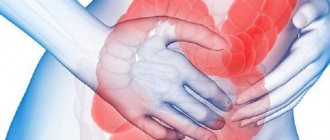The first signs of pregnancy are varied, often manifesting several symptoms at the same time. In addition to delayed menstruation, morning sickness, increased fatigue, constant drowsiness and diarrhea are observed as signs of pregnancy. Associated symptoms require consultation with a doctor; they may be harbingers of the onset of pregnancy and the first manifestations of diseases of a woman’s internal organs.
Intestinal upset as a symptom of conception
Delay and absence of menstruation are not the only indicators that a woman has become pregnant. At an early stage, other symptoms associated with the characteristics of ongoing processes in the body during this period can also signal pregnancy.
After conception, pregnancy does not occur instantly. It can take 7 to 10 days for the embryo to fully attach to the uterus, and even after implantation the female body will perceive it as a foreign body for some time. Therefore, he will try to tear it away. All this causes poor health and decreased immunity. A woman is more prone to colds and acute respiratory viral infections, as well as indigestion. Due to the close proximity of the uterus and intestines, the expectant mother may experience diarrhea, loose stools, heaviness and pressure in the abdomen.
Diarrhea without other signs of pregnancy is not a symptom. Most likely, it is caused by other reasons:
- intestinal infection;
- poisoning;
- dysbacteriosis;
- pancreatitis;
- gastrointestinal diseases;
- irritable bowel syndrome.
If diarrhea appears against the background of other first signs of conception and does not cause pain, this is usually associated with pregnancy.
Obvious signs include:
- breast swelling;
- increased nipple sensitivity;
- nausea;
- bloody discharge from the vagina.
Principles of treatment
It is important for patients to know that therapy for diarrhea and delayed menstruation is selected solely based on the cause that caused it.
Medicines
Your doctor may prescribe the following medications:
Loperamide is a Russian antidiarrheal drug produced by pharmacological companies, Hemofarm, Ozon. The action of Loperamide is aimed at reducing the tone and motility of intestinal smooth muscles and increasing the tone of the anal sphincter. Prescribed for the treatment of acute and chronic diarrhea of various origins. It has contraindications (pregnancy, children under 6 years of age, lactation, ulcerative colitis, intestinal obstruction).
The cost of Loperamide ranges from 15 to 40 rubles per package.
Smecta is a drug based on smectin, produced by pharmaceutical companies. Smecta is an antidiarrheal and absorbent agent. Prescribed for heartburn, diarrhea, flatulence. Smecta is safe and has virtually no contraindications (except for intestinal obstruction) and side effects. Dispensed without a doctor's prescription.
The average price is 110-160 rubles.
No-shpa is a French myotropic antispasmodic, produced pharmacologically. The main active ingredient is drotaverine. No-spa reduces the tone of the smooth muscles of internal organs, reduces their motor activity, and dilates blood vessels. It can be taken for pain, diarrhea, and increased uterine tone. Contraindications: lactose deficiency, age under 1 year, intolerance to drotaverine.
Causes of loose stools during pregnancy
Diarrhea as a sign of pregnancy is common (more details in the article:
This is explained by the fact that along with loose stools, many nutrients and beneficial microelements that are so necessary for the unborn baby leave the body - their deficiency can negatively affect the development of the fetus.
What could be the reasons that provoke diarrhea or constipation in a pregnant woman in the early stages of pregnancy? The main ones are:
- Hormonal changes. The main hormones, the intensive production of which occurs during pregnancy, are progesterone and estrogen. They are responsible for ensuring that the fetus receives adequate nutrition through the circulatory system, for which they help slow down the digestive system. As a result of the unusual mode of digestion of food, a woman experiences disturbances in her bowel movements. They become more frequent or rare.
- Intestinal or viral infection. In pregnant women, this problem is rarely observed due to their compliance with all nutritional rules. Those who are not yet aware of their situation may encounter the problem of diarrhea caused by this reason.
- Changes in diet. Pregnant women carefully monitor their menu, enriching it with vitamins. Often the amount of fermented milk products in the diet increases, which can lead to loose stools.
- Psychological condition. Any stress, emotional stress, or anxiety can cause diarrhea in a pregnant woman.
Can diarrhea be considered a reliable sign?
The first reliable signs of pregnancy are, of course, nausea, delay or prolonged absence of menstruation. Many are deeply mistaken in believing that diarrhea indicates the long-awaited fertilization of the egg. But if the test shows two stripes, then you should listen to the body’s signals.
- digestive system disorders;
- E. coli or infection;
- poor nutrition;
- insufficient amount of active enzymes;
- eating “heavy” foods and intestinal obstruction;
- problems with the genitourinary system;
- dyspepsia;
- new products to which our body is not accustomed (foreign fruits and vegetables).
If you have severe diarrhea that is accompanied by nausea and fever, it is important to consult a doctor. Any rash actions will harm the mother and child and complicate the course of pregnancy. Health is not something to joke about. It is very important to get advice from a specialist and his recommendations for treatment.
Normal or pathological?
Whether a symptom such as diarrhea in the first months of gestation is normal or pathological depends on the quality, duration and reasons that caused the diarrhea. If a woman observes a minor stool disorder that does not cause her pain, this is not considered a pathological process in the body, but is considered a completely normal phenomenon during pregnancy. Such a deviation does not pose a threat to either the fetus or the health of the mother.
Diarrhea is dangerous only in cases where it is additionally accompanied by the following symptoms:
- frequency of bowel movements exceeds three times a day;
- the consistency of the stool is very watery;
- the presence of an unpleasant specific odor;
- the presence in the stool of mucus, blood, pus or pieces of food that have not had time to be digested;
- temperature increase;
- the presence of a gag reflex and nausea;
- the appearance of severe pain in the stomach;
- The duration of diarrhea exceeds three days without improvement.
With such symptoms, diarrhea is not a sign of pregnancy, but the result of an intestinal infection. In case of pregnancy, the problem requires immediate solution and medical attention.
Similarity of characteristic symptoms with other body reactions
Similarity of characteristic symptoms with other body reactions
There are situations where the most common signs of an interesting position were not one hundred percent proof of the presence of an embryo in the uterus. Such symptoms may indicate the presence of various gynecological diseases or indicate the development of an ectopic pregnancy.
Read more How much blood is released after childbirth
The most striking symptoms, such as absence of menstruation, tenderness of the mammary glands or pain in the lower abdomen, may indicate problems with the reproductive system of the female body. They can appear with excessive weight loss, as a result of the use of hormonal oral contraceptives, or indicate the presence of chronic inflammation, developing tumors, or hormonal imbalance.
Pain in a woman's abdomen and bloody discharge from the vagina may indicate the possibility of a miscarriage or missed pregnancy, be a side effect of taking certain birth control pills, infections or injuries received during sexual intercourse.
Frequent urge to urinate may be a symptom of the presence of some serious diseases in the body - diabetes mellitus or diseases of the genitourinary system (cystitis, pyelonephritis). They may develop as a result of excessive fluid intake or abuse of diuretics.
In this regard, the most reliable way to confirm pregnancy is still to take all the necessary tests and be examined by a gynecologist.
Diarrhea after conception and negative pregnancy test
Diarrhea may be the first sign that conception has occurred, even if the pregnancy test is still negative. However, you should not consider loose stools as the only sign of the birth of a new life. If there is no delay in menstruation and other symptoms have not appeared, diarrhea may be due to many other problems that have nothing to do with the woman’s new position.
A negative test does not always give a reliable result of absence of pregnancy. For a very short period of time, there is a small concentration of substances in the urine that react with the test strip. Tests purchased at a pharmacy may be defective or expired. There is also always a human factor, and not all test conditions can be met, which will affect the reliability of the result.
For this reason, to confirm or refute suspicions of pregnancy, it is better to visit a gynecologist. It is he who will accurately determine the presence of a fetus and determine how long the woman has been in position.
Should I worry?
Doctors identify a unique triad of first signs of pregnancy:
- delay of menstruation;
- nausea;
- vomit.
These symptoms occur in 90% of women when they are not yet aware of pregnancy. The absence of menstruation, combined with toxicosis, is not always a harbinger that a woman is “in pregnancy,” but often this is exactly the case. If the signs are not protracted, inconsistent, have a variable nature and there is no general disturbance in well-being, then there is no cause for concern. All pregnant women complain of disruptions in the intestinal tract. Just look at the forums and reviews of visitors to sites for mommies.
Unfortunately, there are cases when nausea and diarrhea, in the absence of menstruation for a long time, are alarm bells that need to be responded to:
- swelling of the limbs and face;
- increase or decrease in pressure;
- sharp deterioration in condition, weakness, dizziness;
- nagging pain in the lower abdomen.
You should not wait for time and treat yourself. An extra visit to your doctor never hurts.
What to do?
Before taking any action to eliminate loose stools, you should find out exactly the cause that provoked the disorder. If a woman suspects she may be pregnant, she should wait until her period begins. In the case when menstruation is delayed and diarrhea is present, you need to do a test or take a blood test, which, before all other methods, determines the presence of pregnancy.
If there are minor changes in the frequency and consistency of stool that do not cause discomfort to the woman, there is no need to do anything. Usually, digestion improves on its own. If there is no improvement, treatment is required, depending on the diagnosis. However, regardless of what caused the diarrhea, a woman should follow a diet. Its menu should consist of:
- wheat crackers;
- rice porridge;
- fresh fruit;
- lean soups;
- baked apples and pears.
It's important to drink a lot. The daily minimum fluid intake must be 1.5 liters. Regular or mineral water, decoctions and fruit drinks are suitable. If diarrhea continues for a long time, you should consult a specialist and not self-medicate, especially while pregnant.
Ovulatory cycle and fertilization
Ovulatory cycle and fertilization
Ovulation, or the release of an egg from the ovary for the purpose of fertilization, occurs approximately 4-7 days after the completion of the last menstruation. As a result of unprotected sexual intercourse and provided that the female reproductive system is ready, conception can occur with a high degree of probability.
Read more How to treat molluscum on a child’s skin
The fusion of an egg and a sperm produces a new cell - a zygote. It is she who becomes the precursor to the formation of the future embryo.
From the moment the zygote is formed and its division begins, a woman is considered pregnant. After this, you should expect changes in the usual functioning of the body and the appearance of the first characteristic signs. As a rule, they appear quite quickly - a few days after ovulation.
When does diarrhea go away in pregnant women?
When diarrhea is caused by pregnancy, there is a delay in menstruation, and other signs appear; this is a completely normal and common occurrence. The stool becomes slightly watery and the number of trips to the toilet becomes more frequent. Without other alarming symptoms characteristic of intestinal diseases, diarrhea may not be treated. Over time, the uterus rises and reaches the level of the navel. This occurs by 17–23 weeks. Then the stool returns to normal.
It is important to understand that non-intervention is possible only if diarrhea is associated specifically with anatomical features and ongoing processes during pregnancy. Otherwise, treatment is required, since diarrhea has serious consequences for both the health of the mother and the fetus.
Loading…
Share with friends!











